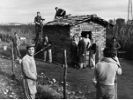Eye For Film >> Movies >> The Roof (1956) Film Review
Bicycle Thieves director Vittoria De Sica skewers post-war Rome in a heartfelt ode to the fortitude of young love and the camaraderie of lower-class communities. The Roof marries the neo-realist grit of the auteur's best-known work with the sunnier optimistic streak evident in Miracle In Milan, without ever ladling on the socio-political subtext. The film stands as a fascinating time capsule, the ridiculous nature of the period's housing policy imbuing the second half with a gnawing tension that keeps the viewer thoroughly gripped to the very end.
Natale and Luisa are a young couple who have impulsively married and are seeking a place to set up home. Visiting their respective families, the pair's union is announced to a mixed reception, but the opinions of others only fuel the young lovers' stubborn determination to make their own way in life.

Working as an apprentice bricklayer in the WWII-ravaged city of Rome, Natale looks into renting over-priced properties and squatting in soon-to-be demolished buildings, with he and his wife's entire belongings strapped to a makeshift rickshaw. Luisa soon sets her sights on a tiny plot of disused railway land, but if they are to build a home there they must do it overnight without the authorities knowing; should the police find a building without a door or roof, they could knock it down and convict the owners.
Il Tetto is graced with another finely balanced script from De Sica's regular collaborator Cesare Zavattini, endowing the film with believable characters, well-observed situations and a brisk pace that keeps the drama fresh and engaging. The performances are all first rate as well, with Gabriella Pallotta and Giorgio Listozzi making for a hugely likable and sympathetic couple, their natural energy and tangible chemistry fleshing out their relationship even further.
It's a pleasure to see a cinematic couple complete with relatable problems and petty arguments as well as a genuine sense of lovestruck enthusiasm. There's a bittersweet pull to their trials and tribulations that makes you really root for them, and De Sica never exploits their plight for easy sentiment.
The expansive cinematography captures a ramshackle Rome that's still full of life and possibility, while the fluid camerawork tracks the characters throughout in a way that immerses the audience in the setting. The subdued but wistful score also enhances the film's atmosphere of hesitant hope, and the supporting cast all strike truthful notes with well-drawn characters that paint an anarchic but heart-warming picture of the working class and those even less well off.
There are lots of little moments to treasure that communicate universal concerns, such as Natale's skinflint brother-in-law bitching about people leaving the bathroom light on, and Luisa wanting to put up a partition between her bed and that of the others she has to share a room with. The couple are surrounded by people who serve as a reminder of their limited options and future strife, but the film remains endearingly upbeat, focusing on how people with nothing will ultimately give everything they can to help one another.
The Roof may not be as well-regarded as De Sica's more famous works, but it stands as a good introduction to his oeuvre as well as a deeply pleasurable example of his no-nonsense style and noble sensibilities. If you're lucky enough to pick up Arrow's Blu Ray reissue, it makes for a brilliant companion piece to the set's main event Miracle In Milan, and a lovely little film in its own right.
Reviewed on: 29 Mar 2012
















